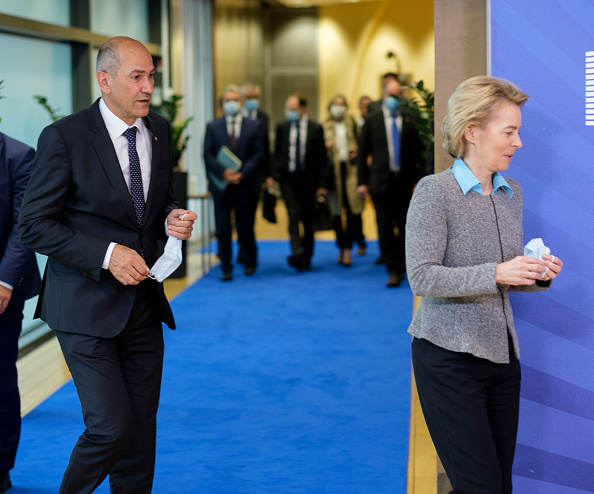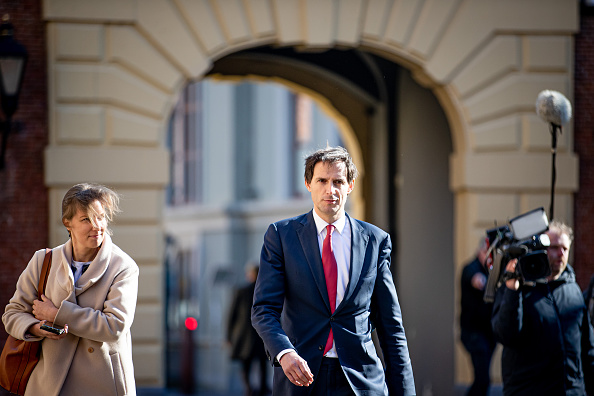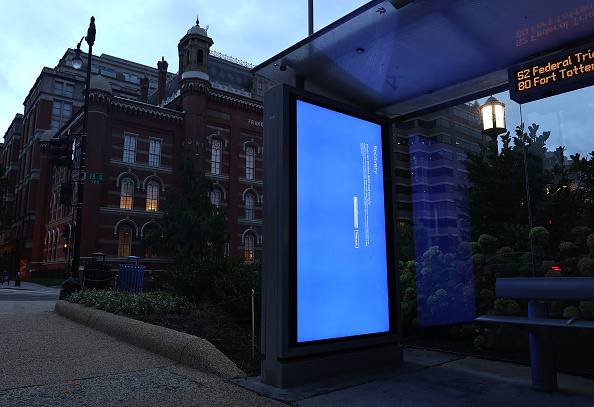As France prepares to host the Olympic Games from July 26, the government of President Emmanuel Macron has put 75,000 police, soldiers, and hired guards on the streets in the largest peacetime deployment of security forces in the country’s history.
Residents and businesses must also negotiate a maze of 44,000 barriers that has now appeared across the capital ahead of the Games that start on July 26.
“Traffic is a mess,” Carol Kilgore, visiting Paris from London, told Brussels Signal. Olympic visitors arrive to find a city with “lots of stations shut and no go areas, especially near the river”, she said.
“Tourists and locals alike are stranded and do not know where to go,” one Paris resident wrote on X. “Accessing the Seine River areas is impossible without a special QR code.”

The cost of a Métro ticket has almost doubled for the duration for the Olympics, with a single journey increasing from €2.15 to €4 between July 20 and September 8.
Normally-busy Métro stops now closed for the Games include the central Paris stations at Concorde, Tuileries, and Champs-Elysées – Clemenceau.

With these public transport shut downs combined with special lanes set aside for Olympics officials in congested traffic, those who live in Paris say the government’s measures have created a two-tier city: one for the Olympic elite heading to the purple track, and a very different experience for its residents.
As a result of the “QR code Olympic Games”, “many people and local businesses lose their most basic rights, like walking on public roads”, said activist group Saccage 2024.

France’s fears of a terrorist attack on the Olympics do not appear altogether unfounded. Macron has been a high-profile supporter of Ukraine — on June 8, he said he was “finalising” a list of Western countries that would dispatch military trainers to be deployed on Ukrainian soil.
On July 23, a French court has already indicted one suspected Russian agent, a 40 year-old chef, who police and prosecutors said was preparing to disrupt the Olympics with a “large-scale”, “serious”, and ” pro-Russian operation”.
France’s internal intelligence agency, the General Directorate of Internal Security (DGSI), said the Russian man, who lived in Paris and had resided in France for 14 years, also passed “intelligence to a foreign power in order to arouse hostilities in France”, French newspaper Le Parisien reported.
A document in his flat was linked to a Russian special forces unit operating under the FSB, Russia’s security service.
In a telephone call intercepted by France’s intelligence services, the Russian man allegedly told a handler from the FSB in May that “the French are going to have an opening ceremony like there has never been before”, reported Le Monde .

French police also arrested an 18 year-old man on July 23 in Gironde, in the Southwest of France, on suspicion of “planning a violent action against the Olympic Games”, interiorminister Gérald Darmanin told the French network BFMTV.
“It’s been established that this person wanted to attack the Olympic Games,” Darmanin added.
Out of around 1 million Olympic volunteers and workers who were subjected to background checks, French authorities blocked 5,000 for reasons that included significant criminal records, left-wing or right-wing political extremism and suspected Islamic radicalisation.
These included 1,000 who Darmanin said France suspected of spying for other countries.
Authorities are concerned that Ukraine’s athletes may be under specific threat and they will receive particular protection, while Israel’s will have 24-hour protection from France’s counter-terror organisation the Groupe d’Intervention de la Gendarmerie Nationale (GIGN).
On July 24, 1,000 police formed an “anti-terror perimeter” outside Israel’s opening football match against Mali, a fixture designated “high risk” after Israeli athletes received death threats.
Muslim-majority Mali broke off its ties with Israel in 1973, while Europalestine, an activist group, said it planned to protest against Israel’s fixtures.

Some residents have used the new proliferation of security gates around Paris as an opportunity to protest at how the Olympics measures have affected their lives.
This included a gym instructor with a QR code who held a July 24 class from the opposite side of the fence from her pupils.
??? FLASH
– Lorsque la prof de gym est la seule à détenir son QR code, ça donne ça#Paris2024 #JO2024#JOParis2024 #Paris #JeuxOlympiques2024
#JeuxOlympiques pic.twitter.com/8jIZBv7uJm— – Le Direct Info ? (@LeDirectInfo) July 24, 2024
Other Paris residents have made popular memes, including a lone sunflower separated from others by a fence, with the caption: “When you do not have a QR code for the Paris Olympics Games”.
Quand t'as un QR code pour les JO de Paris pic.twitter.com/KyuffXHEOE
— Nini_MacBright (@Nini_MacBright) July 23, 2024
In bright sunlight, it turns out, the QR codes become unreadable, which adds further to the chaos for both residents and police, said Le Parisien.

The first athletes started to arrive by July 22 at the Athletes’ Village in Saint-Denis, one of Paris’ most deprived areas.
In a quest to be the most environmentally friendly Games to date, athletes’ rooms feature beds made from cardboard and chairs (mirroring those in the stadium) made from recycled bottle caps.
They do not have air conditioning — although US athletes have brought their own.

The facilities do feature ample supplies of condoms: Olympic-branded ones, 300,000 of which have been dispersed around the Olympic village. “No need to be a gold medalist to wear it!,” says the wrapper of one.

The 14,000 athletes and officials who will stay there have access to a fleet of electric vehicles, part of the Paris organising committee’s efforts to make the 2024 Games environmentally friendly.
A bakery at the north of the village will churn out 2,000 baguettes, croissants, pain au chocolate, and focaccia a day.
Three famous French chefs — Akrame Benallal, Amandine Chaignot, and Alexandre Mazzia — will prepare dishes such as coconut beans with parsley ice cream and crispy mushroom croquettes, served up with cheese platters and French butter.
Ireland is bringing its own porridge for its athletes, Irish team dietician Sharon Madigan told the Irish Times.

For those not staying in the athletes’ accommodations, on July 24 there were still a glut of tickets and hotel rooms available.
There were hundreds of thousands of unsold tickets on the official ticketing website, while the number of unwanted tickets available for resale on the official resale site had exceeded a quarter of a million on July 23.
“By holding back 20 per cent of the tickets until this month, Paris 2024 gave an illusion of scarcity. And now, by releasing the tickets, there’s a huge ticket glut,” Robert Wang, an American marathon runner who will be attending the Olympics as a spectator, told Brussels Signal.
“Closing ceremony tickets are still available for €250,” he said.
“The more expensive tickets are very hard to sell right now, it appears,” added Wang.
“Some people in desperation are offering to transfer tickets for any price at this point,” off of the official resale site where prices are fixed, he said.
And “there’s a risk of being scammed if you try to transfer tickets to a stranger you put online,” Wang added.

As Paris residents lamented the two-tier nature of their city for the Olympics, celebrities including Lady Gaga and fellow songstress Céline Dion enjoyed a private tour of the Louvre, have appeared — amid speculation as to which of them might be performing at the July 26 Opening Ceremony.
The rapper Snoop Dog will be among the last to carry the Olympic torch through Paris, Saint-Denis’s mayor said on X July 23.

“I know the French and I know that they don’t want to retire at 60, or a €1600 minimum wage, but Céline Dion at the opening ceremony,” quipped one Paris resident.
Athletes from poorer neighbourhoods surrounding Saint-Denis told CNN the Olympics meant their own tracks and gyms had been closed for two years.
Local athlete Mallory Leconte, a French athletics international specialising in the 4×100 metre relay, said she had to train on concrete and in a private gym since 2022, when her club Saint-Denis Émotion closed so it could be used as a warm-up area for Olympic athletes.
– Je connais les Français et je sais qu’ils ne veulent pas d’une retraite à 60 ans, ni d’un SMIC à 1600€, mais d’une Céline Dion à la cérémonie d’ouverture, c’est ça qu’ils veulent pic.twitter.com/OXV7KABwLs
— Nini_MacBright (@Nini_MacBright) July 23, 2024
Millions of Paris residents were expected to flee the city rather than stay for the Olympics.
Airlines warned the Games had suppressed ordinarily high levels of summer tourism that in other years would have headed to the French capital.

Authorities have called the area closest to the Seine the “grey zone”, where cafes and normally thriving souvenir shops have largely closed.
Going into this zone after July 18 — whether as a resident, worker, or someone dining in a restaurant — has required a QR code. To get one required applying online and sending in documentation.
There also were “blue”, “red”, and “black” zones, each with different rules.
Restaurant owners hoping for an Olympic-sized bounce in their fortunes are instead virtually empty.
On the night of the opening ceremony, there will be 45,000 police and gendarmes on the streets of Paris, beside 20,000 private security guards and 10,000 soldiers, based in a military base built for the purpose in Bois de Vincennes on Paris’s Eastern edge.
There are also 1,900 police reinforcements sent to France by more than 40 other countries.

The opening ceremony on July 26 will feature 326,000 spectators watching athletes carried down the Seine on 80 boats, from Pont d’Austerlitz to Pont d’Iéna, between 7:30pm and 11pm.

Amid all the closures and QR codes, French popular support for the Games has been, perhaps understandably, muted.
While only 23 per cent of French people felt “satisfaction” over the Olympics, 24 per cent felt “concern”, 36 per cent “indifference”, and 5 per cent “anger”, in a July 15-16 poll.





